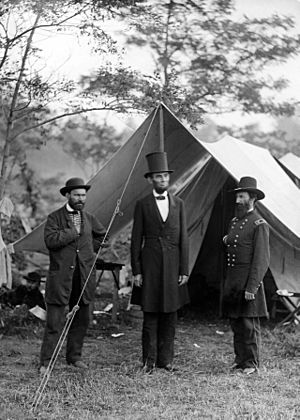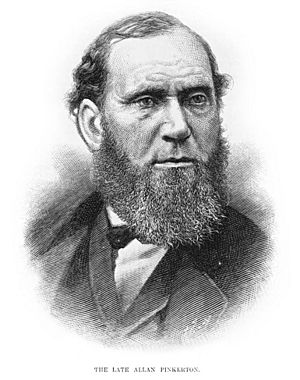Allan Pinkerton facts for kids
Quick facts for kids
Allan Pinkerton
|
|
|---|---|
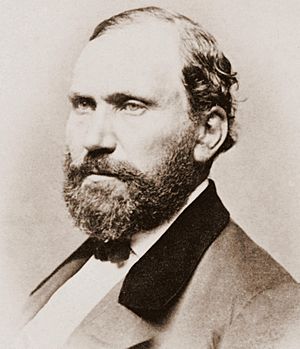
c.1861
|
|
| Born | August 25, 1819 Glasgow, United Kingdom
|
| Died | July 1, 1884 (aged 64) Chicago, Illinois, U.S.
|
| Resting place | Graceland Cemetery, Chicago, U.S. |
| Occupation | Cooper, abolitionist, detective, spy |
| Spouse(s) |
Joan Carfrae
(m. 1842) |
| Children | 3 |
Allan J. Pinkerton (born August 25, 1819 – died July 1, 1884) was a Scottish-American detective and spy. He is famous for starting the Pinkerton National Detective Agency in the United States. He also claimed to have stopped a plan to assassinate President-elect Abraham Lincoln in 1861. During the Civil War, he gathered information for the Union Army. His agents later became known for their work in stopping strikes.
Contents
Allan Pinkerton's Early Life
Allan Pinkerton was born in Glasgow, Scotland, on August 25, 1819. He had to leave school when he was 10 years old after his father passed away. Pinkerton loved to read and taught himself many things. He worked as a cooper, making barrels. As a young man, he was involved in the Chartist movement in Scotland, which worked for political rights for ordinary people.
In 1842, Pinkerton moved to the United States. He settled in Dundee Township, Illinois, near Chicago. He built a cabin and started his cooperage business there. Pinkerton was also an abolitionist, meaning he was against slavery. His home in Dundee was a safe stop on the Underground Railroad, helping enslaved people escape to freedom.
Becoming a Detective
Pinkerton first became interested in detective work by accident. He was looking for trees to make barrels when he found a group of counterfeiters (people making fake money). He watched them and then told the local sheriff, who arrested them.
This led to Pinkerton being named the first police detective in Chicago in 1849. In 1850, he started his own business, which later became the famous Pinkerton National Detective Agency. This agency still exists today. The Pinkerton agency's symbol was a wide-open eye with the words "We never sleep."
As the United States grew, so did rail transport. Pinkerton's agency became well-known for solving train robberies in the 1850s. This work brought him into contact with important people like George B. McClellan, a railroad engineer, and Abraham Lincoln, who was a lawyer for the railroad. In 1859, Pinkerton also helped abolitionists like John Brown by buying supplies for them.
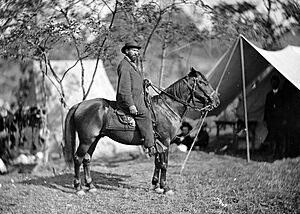
Pinkerton and the Civil War
When the Civil War started, Pinkerton became the head of the Union Intelligence Service. This was like an early spy agency for the Union. He claimed to have stopped a plan to assassinate Abraham Lincoln in Baltimore, Maryland, while Lincoln was traveling to Washington, D.C.
Pinkerton's agents often worked undercover, pretending to be Confederate soldiers or supporters to gather information. Pinkerton himself went on several secret missions, using the fake name Major E.J. Allen. He traveled through the Southern states in 1861, looking for information about Confederate forts and plans. He was almost caught in Memphis but managed to escape.
Pinkerton's work helped create the idea of a federal secret service. The Intelligence Service he led was a predecessor to today's U.S. Secret Service.
After the Civil War
After the Civil War, Pinkerton continued his work tracking down criminals, especially train robbers. He was hired by railroad companies to find the outlaw Jesse James. Even though he didn't catch James, Pinkerton kept trying to track him at his own expense.
In 1872, the Spanish government asked Pinkerton for help. They wanted him to help stop a revolution in Cuba. This revolution aimed to end slavery and give people the right to vote. Pinkerton had written in his book that he was strongly against slavery.
Pinkerton's Personal Life and Death
Allan Pinkerton secretly married Joan Carfrae in Glasgow, Scotland, on March 13, 1842. They were married until he passed away.
Pinkerton died in Chicago on July 1, 1884. It is often said that he slipped and bit his tongue, which led to an infection. Other reports suggest he died from a stroke or malaria. When he died, he was working on a system to collect all criminal identification records in one place. Today, the Federal Bureau of Investigation (FBI) keeps such a database.
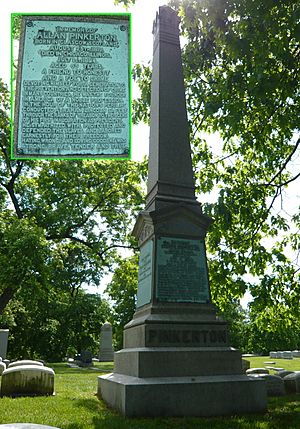
Pinkerton is buried in Graceland Cemetery in Chicago, next to his wife and Kate Warne, one of his famous female detectives. He is also a member of the Military Intelligence Hall of Fame.
Pinkerton's Legacy
After Allan Pinkerton's death, his agency continued to grow. It became very involved in stopping labor movements and strikes in the late 1800s and early 1900s. This changed how many people viewed the Pinkertons.
Even though his agency became known for its anti-labor actions, Pinkerton himself had been involved in pro-labor politics when he was young. He believed in workers' rights but did not support strikes or labor unions.
Allan Pinkerton became so famous that for many years after he died, the name "Pinkerton" was used as slang for any private detective.
Pinkerton's Writings
Pinkerton wrote many popular detective books. These books were supposedly based on his own adventures and those of his agents. Some were published after he died. Most historians believe that Pinkerton hired ghostwriters to write these books. However, the books still have his name on them and share his ideas.
See also
 In Spanish: Allan Pinkerton para niños
In Spanish: Allan Pinkerton para niños
- American Civil War spies
|
 | Jackie Robinson |
 | Jack Johnson |
 | Althea Gibson |
 | Arthur Ashe |
 | Muhammad Ali |


